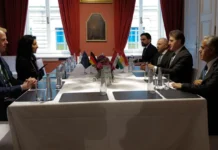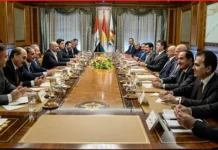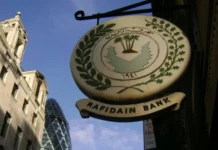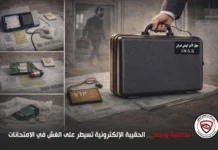Tishwash: Iraq participates in The Market 2.0 conference to keep pace with developments in financial technology.
The Securities and Exchange Commission participated today, Sunday, in The Market 2.0 conference to keep up with developments in financial technology.
The commission said in a statement followed by Al-Masra, that “the head of the Securities Commission, Faisal Al-Haimas, participated, along with the executive director of the Iraq Stock Exchange and the chairman of the Board of Governors, in the work of The Market 2.0 conference, which is being hosted by the Kingdom of Bahrain and organized by the Federation of Arab Capital Markets in cooperation with the Bahrain Stock Exchange.”
She noted that “this participation comes within the framework of the Securities Authority’s keenness to keep pace with global developments in the field of financial technology and digital transformation, to learn about the latest innovations in trading systems, and to enhance expertise in developing the technical infrastructure of financial markets.”
She explained that “the visit also aims to enhance cooperation with regulatory bodies and Arab financial markets and to exchange leading experiences that contribute to developing the regulatory framework and supporting the investment environment in Iraq.” link
Tishwash: The European Union: We support Iraq’s efforts to diversify its economy.
The European Union affirmed its support for Iraq’s efforts to diversify its economy and enhance the role of the private sector in development.
The European Union Ambassador to Iraq, Clemens Simetner, said that the EU program includes cooperation with the Central Bank of Iraq and relevant government agencies in the fight against money laundering, indicating that work is underway to design a joint project with the Central Bank and prepare for its implementation phases, with other parties involved in this endeavor.
He explained that the European Union mission in Iraq focuses on supporting the government’s direction towards diversifying the economy and reducing the burden on the public sector, noting that addressing this challenge requires empowering the private sector and supporting small, medium and emerging industries and projects by providing loans that help them build their capabilities and provide stable sources of income away from government jobs.
The IEU launches the first Energy Auditing training workshop under the “BEIT” project (Building Equitable and Inclusive Transformation), in cooperation with the International Trade Centre (ITC) and the EU Delegation to Iraq.
The Iraqi Engineers Union (IEU) today, Saturday, 22 November 2025, launched its first specialized training program in Energy Auditing under the “BEIT” project, funded by the European Union and overseen by its Delegation to Iraq, in cooperation with the International Trade Centre (ITC). The opening was attended by Eng. Thulfiqar Hoshi Al-Makssousi (President of the IEU), Dr. Zaid Ezz Al-Deen Mohammed (IEU Vice President), Eng. Sinan Safaa Dia (Head of the Press, Publishing and Media Committee), and Eng. Yahya Sami, member of the Cultural Activities Committee (CAC). Also in attendance were Eng. Ali Al-Naseri, representing the EU Delegation to Iraq, and Eng. Mustafa Al-Musleh, representing the ITC, along with a group of participating engineers.
In his opening remarks, Eng. Thulfiqar Hoshi Al-Makssousi affirmed that the Union will continue to deliver modern training programs that elevate professional practice and open new horizons for Iraqi engineers. He noted that the Energy Auditing workshop is a pivotal step toward strengthening engineers’ capabilities in energy efficiency and improving performance across public institutions and the private sector.
The President praised the active partnership with the European Union Delegation to Iraq and the International Trade Centre under the EU-funded “BEIT” project, emphasizing that this cooperation is a practical model of professional integration and international support aimed at developing Iraq’s construction and energy sectors.
For his part, Eng. Ali Al-Naseri, representing the EU Delegation to Iraq, expressed his satisfaction with the launch of this important workshop, noting that the European Union adopts an integrated approach to supporting Iraq by enhancing productivity, empowering institutions, building workforce capacities, and supporting green growth and sustainable development.
In the same context, Eng. Yahya Sami, member of the Cultural Activities Committee and the IEU–EU cooperation focal point, stated that launching this workshop reflects the IEU’s commitment to practical, high-quality training aligned with labor-market needs. He added that the project’s international cooperation helps transfer robust global practices to Iraqi engineers, provides important opportunities to raise engineering awareness and improve professional performance, and ensures sustainability by preparing advanced training staff memebers who can continue even after the cooperation programs conclusion.
This workshop forms part of a broader series of activities under “BEIT” project, aimed at building national capacities, improving energy efficiency and housing services, and developing sustainable solutions that support Iraq’s transition toward a more resilient and sustainable economy. link
************
Tishwash: Iran removes four zeros from its national currency.
Iranian President Masoud Pezeshkian issued a decree to implement an amendment to the Iranian Central Bank Law to remove four zeros from the national currency, the rial.
According to this amendment, the Central Bank determines the Iranian national currency, the “Rial,” and announces it within the framework of the “Governing Currency System.”
According to the statement, the central bank is responsible for determining the exchange rate, but it must also take into account the country’s legal obligations and the amount of foreign exchange reserves.
It should be noted that the aforementioned amendment applies to clause (a) of Article (58) of the Central Bank of Iran Law and was based on Article 123 of the Constitution of the Islamic Republic of Iran.
Earlier, the Iranian parliament approved this amendment in a public session on Sunday, November 2, and the Guardian Council ratified it on November 5.
The Expediency Discernment Council also approved this amendment. Furthermore, the Guardian Council did not deem it contrary to Islamic law or the constitution, thus allowing the removal of four zeros from the national currency, the rial.
The amended text emphasizes that the announcement of the exchange rate must be “within the framework of the prevailing monetary system, taking into account Article 44 of the Central Bank Law.” link





